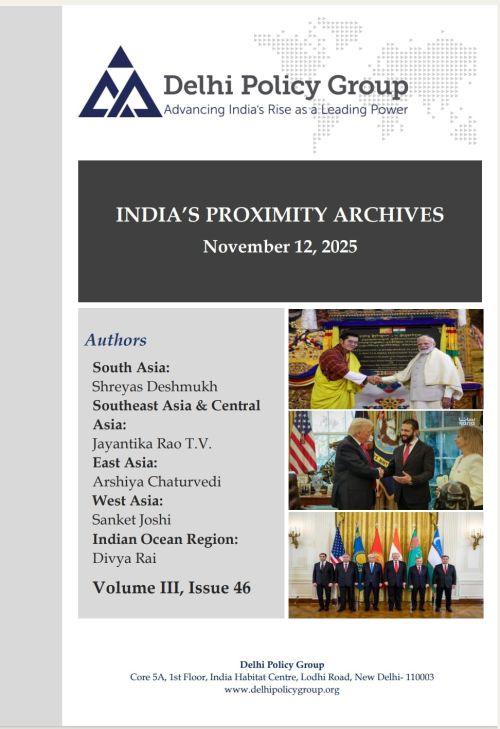India’s Proximity Archives
South Asia
An explosion in New Delhi on November 10 resulted in the deaths of 13 people. Preliminary investigation suggests that the incident was a terrorist attack perpetrated by terrorist organizations linked to Kashmir. From October 30 to November 8, the Jammu and Kashmir police apprehended five terrorists from the Kashmir Valley. These included three physicians affiliated with Al Falah University in Faridabad, Haryana, and Saharanpur, Uttar Pradesh. As per media reports, the terrorist module was connected to Jaish-e-Mohammad (JeM) and Ansar Ghazwat-ul-Hind (AguH). The Delhi attack happened amidst the police’s operation to uncover the terrorist module. Meanwhile, on November 9, the Gujarat ATS apprehended a Hyderabad-based physician who received his education in China, along with two individuals implicated in a conspiracy concerning chemical weapons and affiliations with ISIS.
Southeast Asia
On November 10, Thailand announced that it was suspending implementation of a peace agreement with neighbouring Cambodia after a landmine blast injured two Thai soldiers near the disputed border just two weeks after US President Donald Trump presided over its signing. The Royal Thai Army said in a statement that the landmine explosion in Sisaket province left one soldier with a severe leg injury, while pressure from the blast caused another to experience chest pains. Thai government spokesman Siripong Angkasakulkiat said that Bangkok would cease “follow-up to the joint declaration”. Thai Prime Minister Anutin Charnvirakul told a news conference on the same day that he agreed with the decision taken by the country's defence chiefs, saying the “security threat.... has not actually decreased”.
East Asia
On November 7, Sanae Takaichi remarked that “an attack on Taiwan that poses an existential threat could result in the deployment of Japanese forces”. Further expounding on Taiwan contingency amid rising tensions, which require preparing for a worst-case scenario, she noted that Japan could invoke its right to collective self-defence to support an ally. The remarks have elicited the strongest objections from the Chinese side, with the demand to take these down. On November 10, Sanae refused to withdraw her statement in parliament but emphasised exercising caution in future for matters involving security.
West Asia
US President Donald Trump held a meeting with Syrian President Ahmad Al-Sharaa at the White House on November 10. Al-Sharaa is the first President of Syria to visit the White House since the country’s independence in 1946. The two leaders discussed ways to enhance bilateral relations as well as other regional and international issues of mutual concern. The US removed the Syrian President, a former militant linked to al-Qaeda, from its Specially Designated Global Terrorist List and announced new sanctions relief for Syria, suspending measures under the Caesar Act for an additional 180 days. President Trump pledged to support Syria’s efforts to rebuild its economy, combat terrorism, and provide prosperity to the country’s citizens, including its ethnic and religious minorities such as Druze, Alawites, Kurds, and Christians.
Central Asia
On November 6, Central Asian leaders met with U.S. President Donald Trump for the 10th C5+1 Summit. During the meeting, Trump emphasized plans to diversify U.S. purchases of critical minerals—such as uranium, copper, and rare earth elements—in order to “reduce reliance on China and Russia for essential supply chains.” Among the business deals announced was an agreement for Boeing to sell up to 37 airplanes to airlines in Kazakhstan, Tajikistan and Uzbekistan combined. On his Truth Social channel, Trump highlighted Uzbekistan’s commitment to purchase US$100 billion worth of American goods and services over the next decade, spanning critical minerals, aviation, infrastructure, agriculture, and information technology. Meanwhile, Kazakhstan announced 30 deals valued at US$17.2 billion, including a finalized US$1.1 billion agreement granting a U.S. firm rights to develop major tungsten deposits.
Indian Ocean Region
Indian Naval Ship (INS) Sahyadri is currently at Guam in the Northern Pacific Ocean to participate in the multilateral Exercise Malabar-2025, which involves the navies of India, the United States, Japan, and Australia. Exercise Malabar-2025 consists of a Harbour Phase at Guam, featuring operational planning, alignment of communication protocols, familiarisation visits, and sports fixtures, followed by a Sea Phase where ships and aircraft will engage in advanced naval drills, including joint fleet operations, anti-submarine warfare, gunnery exercises, and flying operations. The participation of INS Sahyadri reaffirms India’s partnership with Quad nations and its commitment to strengthening coordination, enhancing interoperability, and safeguarding regional maritime security.



